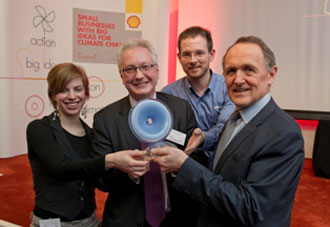| Feb 25, 2011 |
Cella Energy Ltd scoop Shell Springboard 2011 title with hydrogen storage technology
|
|
(Nanowerk News) Cella Energy was named the national winner for the Shell Springboard Awards 2011, for developing a technology which allows hydrogen to be stored in a cheap, practical way, bringing the prospect of hydrogen fuelled cars one step closer to reality.
|
|
Cella Energy's invention uses nanotechnology to store hydrogen safely in tiny micro-beads (smaller than a grain of sand) which then release hydrogen when heated, producing energy which can fuel cars, lorries, ships or planes. Storing hydrogen in this way means that it can be safely transported in micro-bead form opening the door to it being available at petrol stations for consumers.
|
 |
| L to R: Atahl Nathanson, Stephen Voller and Dr Arthur Lovell (Cella Energy Ltd) and James Smith (Chairman, Shell UK)
|
|
The hydrogen micro-bead technology is compatible with standard combustion engines and can either be used as an additive to conventional fuels where it would reduce carbon emissions, or on its own to make hydrogen gas creating zero-carbon vehicles.
|
|
Cella Energy received their award at a ceremony held at the Royal Society of Science in London. Their invention impressed a panel of judges which included leading climate change expert Lord Oxburgh, UK Low Carbon Business Advisor Professor Julia King and Greenpeace Chief Scientist Doug Parr.
|
|
Stephen Voller from Cella Energy said:
|
|
"Being named the overall Shell Springboard winner for 2011 is a great boost for Cella Energy which will give us real credibility in the eyes of customers and potential investors alike. The £40,000 will enable us to scale up our technology to an industrial scale in order to help us realise our ambition of providing a safe, zero-carbon hydrogen fuel which can be used to power the transport industry and dramatically cut carbon emissions.
|
|
James Smith, Chairman of Shell UK, said:
|
|
"Over the last six years, Shell Springboard has supported over fifty small businesses that have new ideas for products and services to tackle climate change. They have received no-strings-attached financial awards totalling £2 million. It's great to these businesses still coming through even in these tough times. Congratulations and best wishes for success to Cella Energy."
|
|
Vphase plc was named as the Shell Springboard runner up 2011 for its product which lowers and regulates household voltage use allowing customers to immediately cut their energy costs without changing their energy supplier or lifestyle.
|
|
The Vphase product reduces and manages the voltage coming into people's homes, to ensure most electrical appliances use less electricity and cost less to run, in turn lowering carbon emissions. This reduction of domestic voltage can lead to a decrease in household electricity bills of between six to twelve per cent.
|
|
The three other finalists competing last night were:
|
|
Ashwoods Automotive Ltd, which has designed a product that regulates and lengthens the lifespan of electric car batteries, which can cost up to £50,000 each
Cambridge Carbon Capture, which has created technology that captures and stores CO2 from the atmosphere. The product also produces CO2 free electricity in addition to carbonate which can be sold to the building industry
Naked Energy Ltd, which has developed a solar panel which is able to generate both electricity and hot water in cool climates.
|
|
The global market for low carbon goods and services, which is already worth over £3 trillion, is expected to exceed £4.5 trillion by 2015, with the UK market the sixth largest in the world. Nearly 200 small businesses from across the UK entered the Shell Springboard awards this year.
|
|
The 2010 Shell Springboard award winners, Hi Mag Solutions Ltd, used their award to hire a new production engineer, allowing them to develop and introduce new high quality solar powered products. The recognition of winning a Shell Springboard Award has helped Hi Mag Solutions attract investment interest drawn engineering talent to their business.
|

